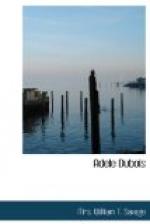A month had thus passed away. A marked improvement had taken place in Mrs. Lansdowne’s health, and John proposed that they should go to Naples and make an excursion thence to Pompeii.
One morning, they drove out from the swarming city toward those famous ruins, revealing to the curious so much of the old Roman civilization. After a drive of twelve miles past fields of lava and ashes, the accumulations from recent irruptions of Vesuvius, they arrived at the street of tombs, a fitting entrance to the desolated city. Here, the beautifully sculptured monuments, memorials of a departed generation, awoke in their hearts a peculiar interest. Through these they entered at once into the inner life of joys and sorrows of an extinct race.
“How terrible death must have been to these people, whose ideas of the future world were so vague and unsatisfying, and who had really no knowledge of immortality!” said Mrs. Lansdowne.
“Yes”, replied John. “And with nothing brighter or more glorious to look forward to in the beyond, how reluctant they must have felt to leave these glowing skies, this delicious air, these scenes of beauty and art, for the darkness of the grave. I fancy it must have been harder for them than if they had been surrounded with the sombre tints, the chilling atmosphere, and the more subdued forms of life in our own clime”.
Leaving the cemetery, they passed on through the narrow streets, paved with blocks of lava, on which were the traces of carriage wheels worn into the material more than eighteen hundred years ago. They went into the Pompeian houses, walked over the marble mosaic floors, looked at the paintings on the walls, examined the bronzes, the statues, the domestic utensils, the shop of the oil merchant, with his name on it still legible, until, in imagination, they began to people the solitude,—bringing back the gay, luxurious, beauty-loving Pompeians again to live and revel in their former haunts.
At length, quite exhausted, Mrs. Lansdowne sank down on a seat in one of the porticoes, and John, placing himself by her side, tempted her to partake of a lunch he had provided for the occasion.
Soon, the pensive influences of the scene stole over them, and they sat for some time in perfect silence.




